Cool weather could corral blazes that made thousands flee New Mexico village
One person was killed in the fire, which caused damage to hundreds of structures and led to a mass evacuation.
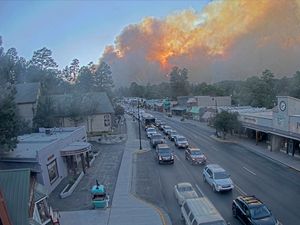
Cooler weather — and the chance of rain — could bring some relief but also the risk of danger this week to firefighters battling blazes in southern New Mexico that killed one person, damaged hundreds of structures and forced thousands to evacuate.
Strong wind pushed the larger of two wildfires into the mountain village of Ruidoso, forcing residents to flee immediately with little notice.
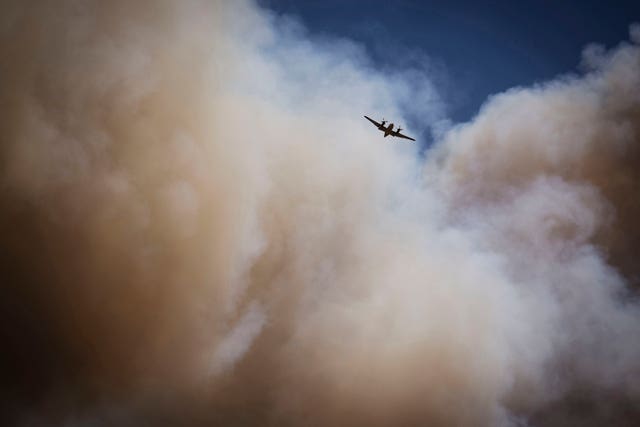
Weather patterns were shifting later in the week with moisture from a tropical wave in the Gulf of Mexico, Bladen Breitreiter of the National Weather Service office in Albuquerque said on Wednesday.
“It will be a challenging situation going into the late afternoon and evening,” said Mr Breitreiter, who has been an incident meteorologist at past wildfires.
“The potential for scattered to isolated thunderstorms could help, but it depends on where they hit. If the rain misses the fires, downward winds could cause problems for firefighters on the ground.”
He said rain could also lead to dangerous flash flooding in newly burned areas in the mountainous region.
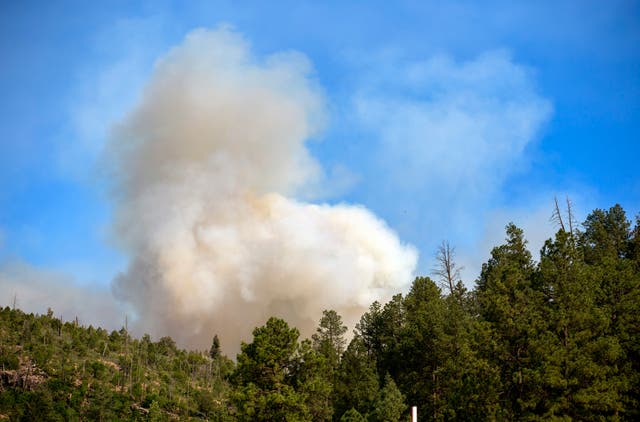
Ruidoso and much of the South West has been exceedingly dry and hot this spring. Those conditions, along with strong wind, whipped flames out of control, rapidly advancing the South Fork Fire into the village.
Along with homes and businesses, a regional medical centre and the Ruidoso Downs horse track were evacuated.
Governor Michelle Lujan Grisham’s office confirmed one fatality as a result of the fire but said it had no further details.
About 1,400 structures have been destroyed or damaged, but it’s unclear how many were homes. A flyover to provide more accurate mapping and a better assessment of damage is being organised, Ms Lujan Grisham said.
Ardis Holder left Ruidoso with her two daughters, her gas tank nearly on empty as she prayed that they’d make it out safe. She was sure the house she rented in the village she grew up in is gone, based on the maps she’s seen so far.
“We were already seeing where all the fire hit, it’s everywhere,” she said from a shelter in nearby Roswell. “If there’s something standing, that’s awesome. But, if not, we were prepared for the worst.”
Ms Lujan Grisham declared a county-wide state of emergency that extended to the neighbouring Mescalero Apache Reservation where both fires started and deployed National Guard troops. The declaration unlocks additional funding and resources to manage the crisis.
Nationwide, wildfires have scorched more than 3,280 square miles (8,495 square kilometres) this year — a figure higher than the 10-year averages, according to the National Interagency Fire Centre.
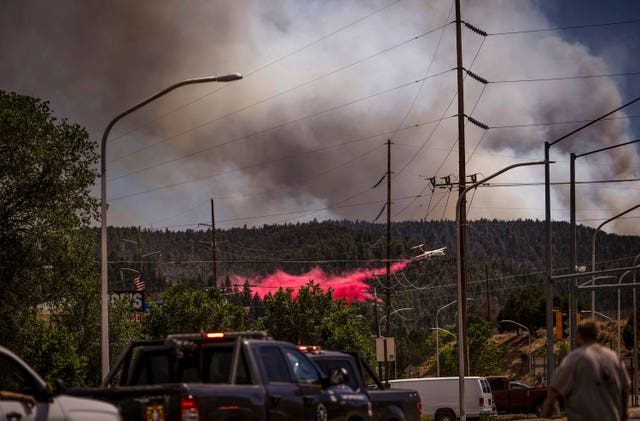
About 20 wildfires currently burning are considered large and uncontained, including blazes in California and Washington state.
Ms Lujan Grisham said the two southern New Mexico wildfires together have consumed more than 31 square miles (80 square kilometres). The exact causes of the blazes haven’t been determined, but the Southwest Coordination Centre listed them as human-caused.
“We are deploying every available resource to control these fires,” she said.
While many older residents call Ruidoso home year-round, the population of around 7,000 people expands to about 25,000 during the warmer months, when New Mexicans and Texans from hotter climates seek the cool of the leafy aspen trees, hiking trails and a chance to go fishing.
Nestled within the Lincoln National Forest, Ruidoso boasts nearby amenities including a casino, golf course and ski resort operated by the Mescalero Apache Tribe.
Horse races at the Ruidoso Downs also draw crowds as home to one of the sport’s richest quarter-horse competitions.
Ruidoso residents fled through traffic-clogged downtown streets some described as apocalyptic, with smoke darkening the evening sky, embers raining down and 30m-high flames in the distance climbing over a ridgeline.
The evacuation order came so quickly that Christy Hood and her husband Richard only had time to grab their two children and two dogs. Heavy traffic on the way out turned what should have been a 15-minute drive into a harrowing two-hour ordeal.
“As we were leaving, there were flames in front of me and to the side of me,” said Mrs Hood, a real estate agent in Ruidoso. “And all the animals were just running — charging — trying to get out.”
On social media posts, Ruidoso officials didn’t mince words: “GO NOW: Do not attempt to gather belongings or protect your home. Evacuate immediately.”
As Jacquie and Ernie Escajeda left church, they saw smoke rise above a mountain behind their house.
They kept a close eye on their mobile phones and turned on the radio for updates. There was no “get ready” nor “get set” — it was just “go” Mr Escajeda said. They grabbed legal documents and other belongings and left.
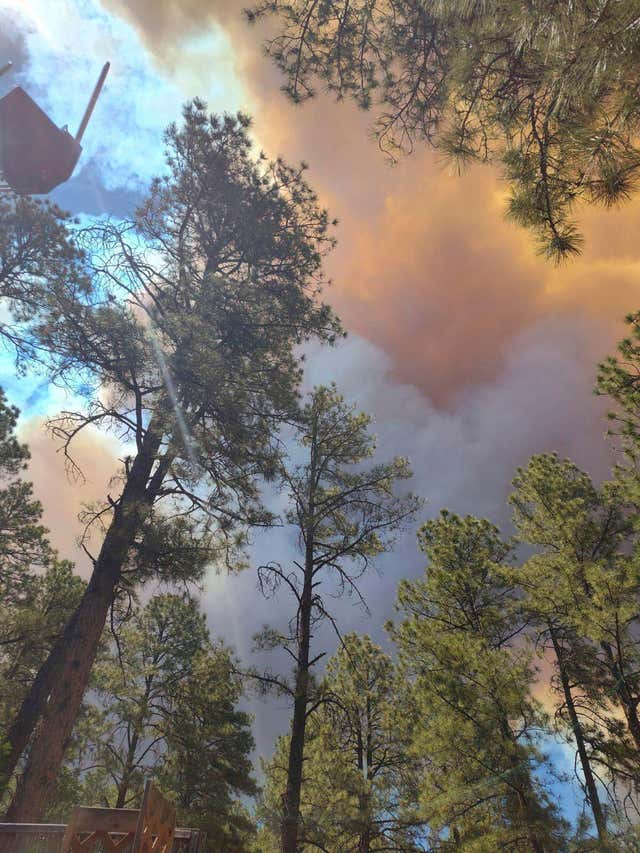
On Tuesday, the couple got a call from friends who have a home in Ruidoso that they’ve been told was destroyed, Mrs Escajeda said.
“They lost their home,” she said. “There’s only one home standing in the whole little division that they live in, so there are a lot of structures lost. We have no idea if we’re going to have a home to go to.”
Public Service Company of New Mexico shut off power to part of the village due to the fire.
Ms Lujan Grisham said mobile service had been affected in some communities near the fire, and mobile cell towers were being set up to restore communications.
Amid highway closures, many evacuees had little choice but to flee eastward and to the city of Roswell, 75 miles (121 kilometres) away, where hotels and shelters quickly filled. A rural gas station along the evacuation route was overrun with people and cars.





